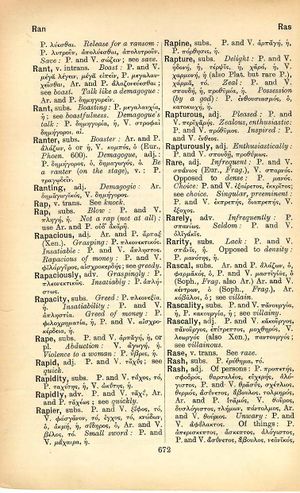rare: Difference between revisions
Τὰ μικρὰ κέρδη ζημίας μεγάλας (μείζονας βλάβας) φέρει → Minora noxas lucra maiores ferunt → Die kleinen Ränke tragen große Strafe ein
(nlel) |
(3) |
||
| Line 18: | Line 18: | ||
{{nlel | {{nlel | ||
|nleltext=[[δαιμόνιος]] | |nleltext=[[δαιμόνιος]] | ||
}} | |||
{{LaEn | |||
|lnetxt=rare rarius, rarissime ADV :: sparsely, thinly; at wide intervals, loosely; rarely, seldomly | |||
}} | }} | ||
Revision as of 05:55, 28 February 2019
English > Greek (Woodhouse)
adj.
Infrequent: P. and V. σπάνιος (Eur., Frag.), V. σπαρνός. Opposed to dense: P. μανός. Choice: P. and V. ἐξαίρετος, ἔκκριτος; see choice. Singular, preeminent: P. and V. ἐκπρεπής, διαπρεπής, V. ἔξοχος.
Latin > English (Lewis & Short)
rārē: adv., v. rarus.
Latin > French (Gaffiot 2016)
rārē¹⁴ (rarus), d’une manière peu dense, peu serrée : Col. Rust. 2, 9, 6 || rarement : Pl. Rud. 995 || -ĭus, -issime Col. Rust. 2, 9, 2 ; 11, 3, 29.
Latin > German (Georges)
rārē, Adv. (rarus), I) dünn, spärlich, weit auseinander, hier und da, conserere, Colum. 2, 9, 6: rarias contextus saccus, Colum. 9, 15, 12: rarius serere, Colum. 2, 9, 2: rarissime disserere od. ponere, Colum. 11, 3, 29 u. 35. – II) übtr., der Zeit nach selten, hin und wieder (Ggstz. saepe), Plaut. rud. 995 Sch. (nach Charis. 217, 8 sq., nach dem es auch Cato u. Cic. gebraucht haben). Cornif. rhet. 3, 15 u. 4, 25 Kays. (Klotz u. Friedrich raro). – rare von Varro b. Gell. 2, 25, 8 überh. verworfen.

